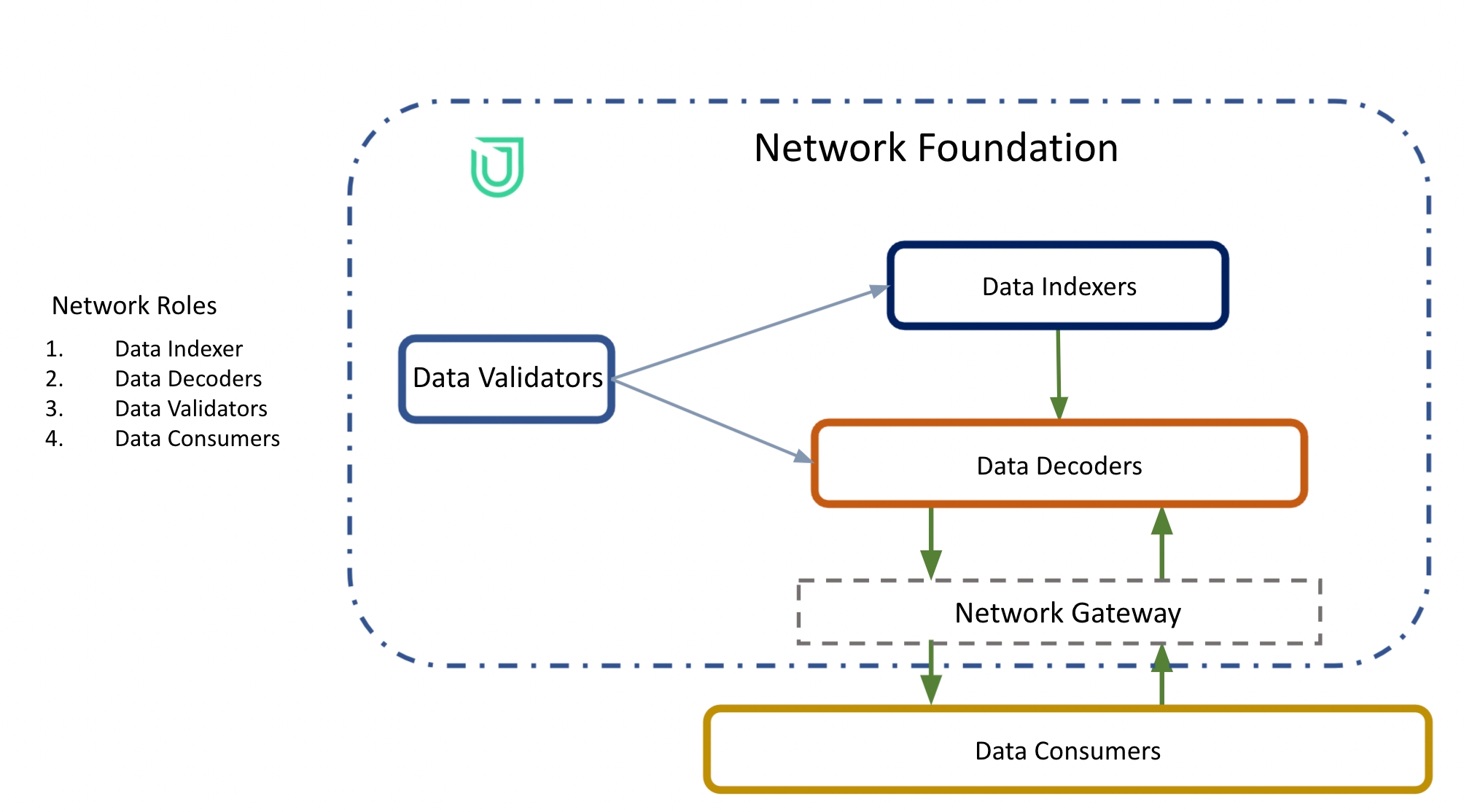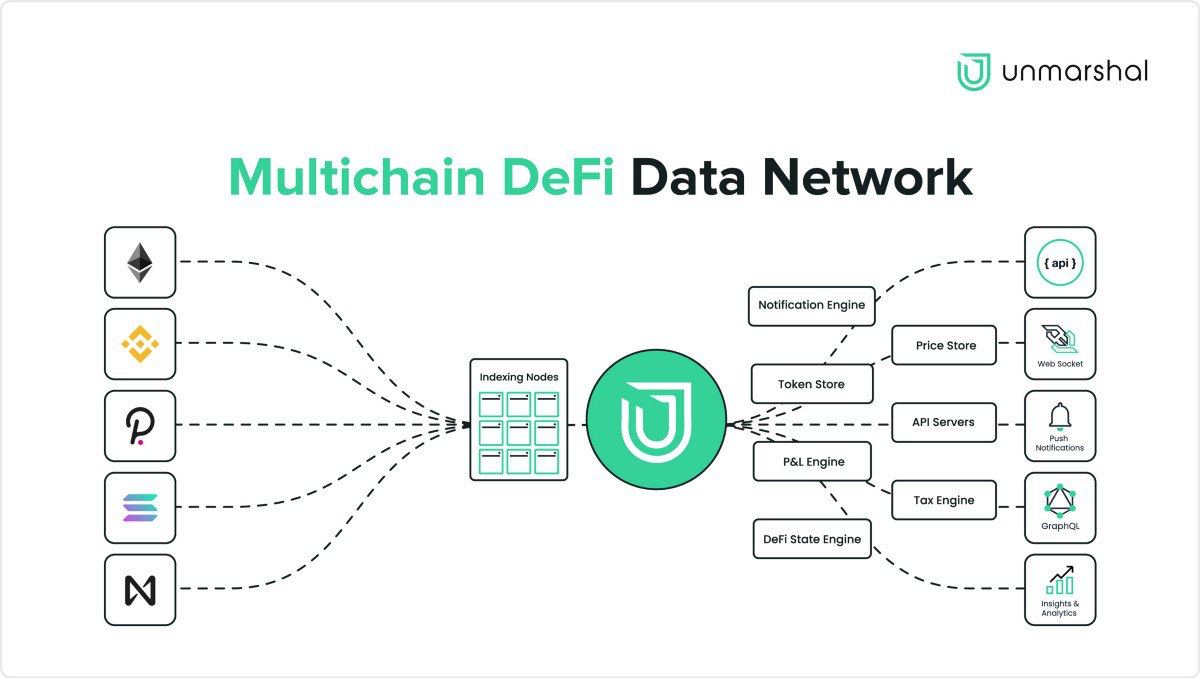Introduction
Unmarshal
Unmarshal is a Chain-Agnostic blockchain protocol consisting of a network of blockchain indexes to curate customizable data for DeFi applications. Synergistically built with the support of Binance Smart Chain, Polkadot Network and Solana, Unmarshal intends to revitalize data collection, distribution, and interpretation to propel the DeFi economy.
It is an advanced solution that aims at transforming raw and unstructured blockchain data into meaningful form to ease the integration of real-time blockchain data into decentralized applications, thus unmarshalling the potential of DApps.
Highlighting the Key Attributes of UnMarshal Network
The primary characteristics redefining data access and implementation in the fast-paced decentralized economy include:
Structured data: The availability of raw and unstructured on-chain data makes it tedious for decentralized applications to decode it into a structured format. With UnMarshal, the requested data is presented in a structured format that is accurate, reliable, and valuable, allowing developers to focus on the application aspect. It transforms plain hashes into useful information.
Multi-Chain Operability: The lack of interoperability is one of the significant limitations for DeFi adoption. By employing UnMarshal’s distributed network of blockchain indexers, the availability of customized data from different chains will be simple and seamless.
Comprehensive SAAS Solutions: UnMarshal Network utilizes cutting-edge technological solutions that ease the creation of APIs. Therefore, the infrastructure is not limited to API’s but also involves projecting data into multiple formats such as GraphQL, WebSockets, Notifications.
Democratized governance: UnMarshal’s decentralized network constitutes multiple distributed nodes promoting the liberation of power for clients to choose data indexers from a pool of nodes.
Automated Indexing: The automated indexing of real-time data of multiple chains in accordance with the submission of indexing requests for various DeFi protocols such as AAVE, Compound, Circle, etc., as per client requirement. It will allow clients to employ a cost-sharing model as per their needs to index new chains.
Solutions:
Wallets to track users' token balances, transactions, and protocol positions with Unmarshal's APIs. Keep your users up to date on their wallet transaction with Unmarshal smart notifications.
DeFi Protocols: To track protocol volumes, analytics, transactions and user positions for lending, borrowing, liquidity with Unmarshal's protocol engine
Exchanges: For tracking token metrics, protocol metrics and price trends with Unmarshal's APIs, Websockets
Investors: Make better investment decisions with Unmarshal's insights & analytics dashboards and price trend notifications
UNMARSHAL NETWORK Introduction
Unmarshal is a multichannel DeFi data network aiming to provide infrastructure support to decentralised applications. Using the network nodes developers can easily integrate end points to query data from different chains, without worrying to decode and adapt to their native applications.
Although there are prevalent solutions that provide data from blockchains, they lack efficient infrastructure for building a scalable, reliable access to multi-chain data. The ceaseless DeFi ecosystem is at a constant lookout for a robust solution that can provide decoded and meaningful data through multiple data avenues.
Unmarshal Foundation would oversee the network which will include the Advisors, team members of unmarshal Our Advisors Ravindra Kumar, CEO Frontier Mateusz Grezlak, CTO at Kira Network Vetrichelvan J, CTO at Frontier Shreedhar K S, CTO at Oddz Kernel Community Mentors
Why Decentralised Network?
Whole reason to move to decentralization is to have trustless services serving data uninterruptedly . Having centralized Data source may be less expensive and light weight, It introduces the single source of trust and single source of failure problem. Unverified data from centralized sources may be ok for applications that are view-only, But clients who depend on data for high value transactions, Data needs to be verified. Along with this, Decentralized data also helps to achieve the scale and Reliability. Use Cases: - Data Verification - API Engine - Marketplace for Insights & Analytics - Marketplace for Notification Signalling
How are we planning our decentralised network? - Proof of Staked Authority - Limited number of Validators - Validator set are elected in and out based on a staking based governance To ensure economic security of The Unmarshal Network and the integrity of data being queried, participants stake and use Native Tokens (MARSH). MARSH is an ERC-20 on the Ethereum blockchain, used to allocate resources in the network. Active Indexers, Decoders and Delegators, Validators can provide services and earn income from the network, proportional to the amount of work they perform and their MARSH stake.
Network Roles:
1. Data consumers: Tech skills Level : none Data consumers are applications that require blockchain data to implement their business use cases. Ex for such applications are wallets, DeFi protocols, Aggregation layers, Payment services and more. Data consumers need to stake MARSH to participate in the network and they pay for successful data queries using MARSH token.
2. Data Indexers : Tech skills Level: High Indexing Node operators that compete to provide the best service at the lowest price. Indexers stake the native tokens to participate in the network. Their performance and ranking is determined by Response time, success rate and data correctness. Indexers should have the knowledge about deploying and monitoring a microservice and databases
3. Data Decoders: Tech skills Level: High Data decoders are middleware builders who use the indexed data and build specific products under unmarshal data. These customized solutions include Balances API, Transactions, Protocols states, Notification engines, Profit and loss engines and more. Data decoders stake native tokens to participate in the network.
4. Data deployers: Tech skills level: High These are the user facing roles that can work closely with Data consumers to build customised solutions using unmarshal products/indexers. This is inspired by the “deploy engineer role of palantir. Data deployers work on the requirements given by the consumers. This avoids all the clients having technical understanding of building the last mile data access logic.
5. Data validators: Tech skills Level: medium Data validators are the police of the unmarshal network. They pick the random requests and cross check them using the integration test suite provided by the network to check on the data correctness, response time, availability and reliability of the network participants such as Indexer, decoder. 6. Delegators: Tech skills Level: none Delegators are individuals who delegate stake to Indexers to contribute to securing the network without running a Node themselves. By delegating to Indexers, Delegators earn a portion of query fees and rewards earned by that Indexer. Delegators select Indexers based on their performance on measures like query fee rates, past slashing and uptime as well as delegator parameters like the cut of fees and rewards from the Indexer.
Last updated

